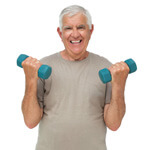Male hormone imbalance is related to many conditions, including depression, decreased libido, increased belly fat, low energy and depleted muscle mass. However, andropause–or natural, age-related testosterone loss—is also a very real condition which is often confused with imbalance. This leads to many older men relying on supplements or replacement therapies in attempts to regain their youth.

This means that if you are considering using either supplements or replacement therapy, it is best to first determine why treatments may be needed. For those with hormone imbalance due to conditions other than age, certain replacement therapies and possibly some supplements may help.
However, if your low testosterone is due to andropause, you may want to consider other, more natural approaches to slowing your age-related testosterone decline. (1)
Embracing the Inevitable
Whether we like it or not, we are all getting older. Yes, we would like to beat the odds and find the magic potion, fountain or whatever to keep us young, vibrant and healthy, although the fact of the matter is that this is impossible.

For instance, regular exercise and a healthy diet can not only help you look and feel younger, both can help you maintain healthy hormone production. This is because when you use it, you don’t lose it—at least not as quickly.
Even so, some may be tempted to go the route of replacement therapy even in the case of natural decline. While the short-term results may be there, this route is discouraged for a number of reasons, including:
- Increased risk of some cancers
- Increased risk of cardiovascular disease
- Acne
- Swelling of the breasts
- High red blood cell counts which can lead to increased clotting and risk of stroke (2)
However, if you experience male hormone decline that is due to reasons other than natural aging, and your doctor agrees that the reward outweighs the risk, hormone replacement therapy may be the answer. If so, it is recommended that bioidentical treatments—or plant-based, naturally produced hormones which identically match those made by your body molecule-by-molecule—are used over conventional therapy. (3)
Slowing it Down Naturally

Fortunately, there are some lifestyle choices you can make to slow its onset, which include:
- Get enough exercise—Studies show that exercise, especially weight training and high-intensity interval training (HIIT), can increase serum levels of both testosterone and growth hormone in young and old test recipients. While the effects are greatest in young test subjects, getting enough intense exercise weekly is nonetheless an important part of maintaining healthy levels of these two important hormones. (4)
- Maintain a healthy weight—Not only can being overweight lead to low testosterone, low testosterone can lead to obesity. This double-edged sword means that losing weight can help increase testosterone levels, and healthy testosterone levels can help you lose weight. However, both start with maintaining a healthy diet along with an exercise program which delivers at least 2 strength training sessions per week along with (preferably) daily aerobic activity. (5)
- Eat a balanced diet which includes plenty of good fats—When it comes to maintaining healthy testosterone levels and weight, a high-protein diet consisting of natural whole foods and good fats is key. This means balanced omega 3-6-9 fatty acids such as from avocados or wild salmon and includes foods high in vitamin D and zinc to improve your prostate health and testosterone production.
- Get enough sleep—Getting plenty of deep, restful sleep each night is important to testosterone levels. In fact, at least one study tells us that testosterone levels rise by 15% for every extra hour of sleep you get beyond a bare minimum. (6)
Healthy Hormones for a Healthy You
Many cases of male hormone imbalance are the result of growing older, poor diet, being overweight or a lack of exercise.
This means that simple lifestyle changes such as eating right, exercising and getting enough sleep are usually the best—and safest–means of improving testosterone levels despite your advancing years.
References:
- https://health.usnews.com/health-care/patient-advice/articles/2018-08-29/why-are-older-men-bailing-out-on-testosterone-therapy
- https://www.health.harvard.edu/mens-health/is-testosterone-therapy-safe-take-a-breath-before-you-take-the-plunge
- https://www.healthline.com/health/bioidentical-hormone-replacement-therapy#definition
- https://www.ncbi.nlm.nih.gov/pubmed/2796409
- https://www.ncbi.nlm.nih.gov/pmc/articles/PMC3955331/
- https://www.healthline.com/nutrition/8-ways-to-boost-testosterone#section6




